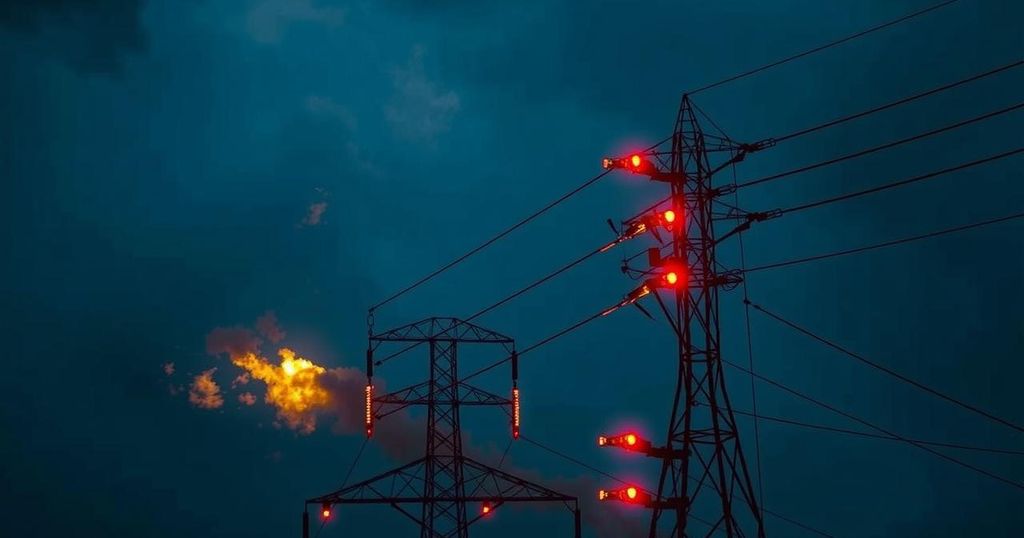Cuban Power Crisis Deepens as Hurricane Oscar Approaches

Cuba is experiencing prolonged power outages affecting millions as Hurricane Oscar approaches, exacerbating an already strained energy grid. The situation has led to heightened tensions among residents, and officials have not communicated a timeline for restoration. The energy crisis is rooted in a combination of aging infrastructure and external pressures, leading to public protests and increased anxiety over essential services.
Millions of Cubans have entered their third consecutive day without power, as efforts to restore electricity have repeatedly failed since Friday. The Cuban Electrical Union reported that approximately 16% of the nation achieved partial restoration before the aging energy infrastructure was again compromised late on Saturday. Currently, officials have not updated the public on expected timelines for full restoration of service. The situation is particularly dire as Hurricane Oscar approaches eastern Cuba, predicted to arrive with severe winds and heavy surf components. Having made initial landfall on Inagua Island in The Bahamas with maximum winds of 80 mph, the hurricane is expected to impact the northeastern coast of Cuba by the afternoon. Forecasters indicate that while weakening is anticipated post-landfall, Oscar may still maintain tropical storm status as it moves northward late Monday and progresses across the central Bahamas on Tuesday. This is not the first instance of a nationwide blackout; on Friday, one of the primary power plants in the country failed, triggering the initial widespread outage. Following claims from officials that power would be progressively restored, another complete blackout occurred early Saturday. The continuous outages are critical as they affect water supply and food preservation across the island. In urban areas like Havana, locals are forming lines for hours to procure basic necessities, such as bread, from a limited number of vendors. Reports indicate rising tensions, as individuals express frustration if passed over in queues. Additionally, residents have utilized messaging platforms to share updates on power status and to coordinate the storage of essential medications amid the outages. While tourists continue to traverse Havana in classic vehicles, many hotel generators have exhausted their fuel reserves. Emergency systems are operational at José Martí International Airport, where deficiencies in power supply have hindered standard functions, causing significant inconveniences for travelers. Some protests have erupted in the capital, spurred by widespread dissatisfaction with the energy crisis. Government officials attribute the turmoil to a combination of factors, including enhanced economic sanctions from the United States, recent environmental disruptions, and the deteriorating state of the island’s infrastructure. In a televised address, Prime Minister Manuel Marrero Cruz stated that substantial sectors of economic activity have been suspended to prioritize generating power for the populace. Meanwhile, Health Minister José Angel Portal Miranda confirmed that medical facilities are relying on generators to deliver essential health services.
Cuba has been facing significant challenges with its energy grid, which has now suffered multiple collapses leading to extended blackouts. The island’s infrastructure is aging, and attempts to restore power have been hampered by environmental factors and geopolitical issues, such as economic sanctions imposed by the United States. The arrival of Hurricane Oscar compounds these difficulties, as the threat of severe weather can disrupt recovery efforts. The chronic energy crisis has widespread implications, affecting not only daily life but also essential services such as healthcare and food preservation, highlighting the interconnected nature of energy reliability and public welfare in Cuba.
In summary, the ongoing power outage affecting millions of Cubans is exacerbated by Hurricane Oscar’s impending arrival, posing significant risks to public health and safety. The repeated failures of the energy grid underscore the pressing need for improvements in Cuba’s infrastructure. As Cuban officials work to navigate these crises, the impacts on daily life and public morale continue to grow, emphasizing the critical role of reliable power supply in sustaining community well-being.
Original Source: www.cnn.com








